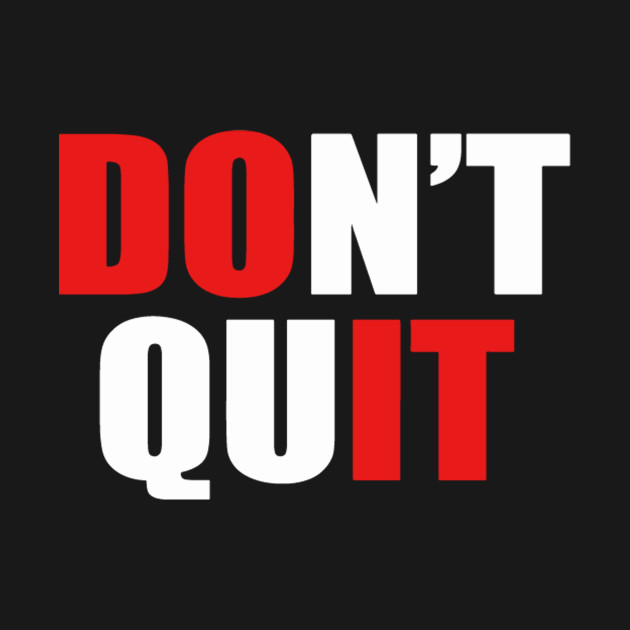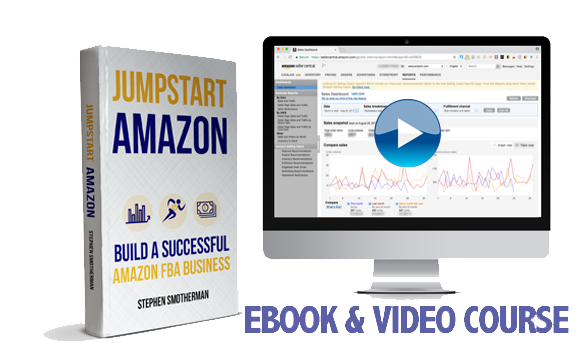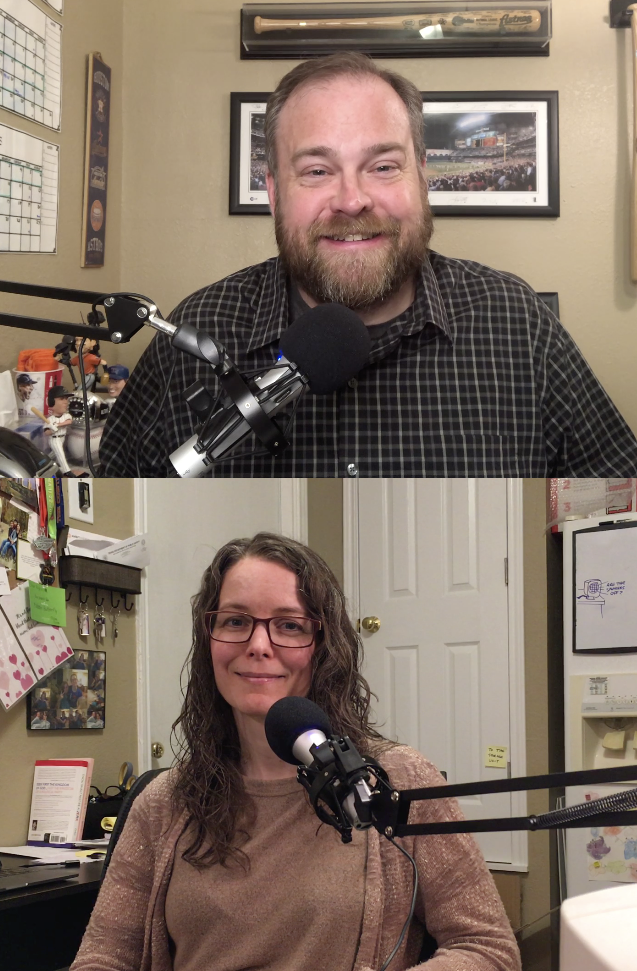How confident do you feel as an Amazon seller? Have you ever felt like you’re just fooling yourself when it comes to actually building and running a successful Amazon FBA business? Do you let the success you see in others make you feel bad about your own minor accomplishments? This is called Imposter Syndrome and it’s an outright lie that your brain tells you sometimes when you’re not currently seeing the results that you’re looking for.
You see, if you listen to these lies that are causing you doubt, then you’re at risk of giving up and actually failing. This ends up being a self-fulfilling prophesy. But today, we’ll talk about how to get past Imposter Syndrome and find the confidence you need to see the success you’re looking for.
Listen on the podcast player below.
Like what you hear? Tell a friend… and be sure to leave us a rating and a review. Here’s how.
Key points from episode 25:
 Imposter Syndrome can happen to both beginner and experienced Amazon sellers.
Imposter Syndrome can happen to both beginner and experienced Amazon sellers.- The 7 ways you can gain more confidence and overcome Imposter Syndrome.
- How to see failures coming before it’s too late and h0w to avoid it.
- A simple strategy to gain more confidence in your sourcing skills.
- The fuel that you can use to help push you closer to meeting your Amazon goals.
- The trap that everyone fall into… and how to get out.
- And much more!
Links and resources mentioned in this episode:
 Beginner course: JumpStart Amazon: Build a Successful Amazon FBA Business. Use coupon code SAVE50 to save $50 off the cost of the JumpStart Amazon course.
Beginner course: JumpStart Amazon: Build a Successful Amazon FBA Business. Use coupon code SAVE50 to save $50 off the cost of the JumpStart Amazon course.- Advanced course: Next Level Amazon: Make a Full-Time Income With Only Part-Time Hours via Amazon FBA.
- The Full-Time FBA Facebook Group.
- The No Risk Strategy to Gain Confidence in your Amazon FBA Sourcing Skills.
Right-click here and save as to download this episode to your computer.
 More Episodes from The Full-Time FBA Show podcast:
More Episodes from The Full-Time FBA Show podcast:
Don’t miss an upcoming episode! Subscribe, download episodes, and review the Full-Time FBA Show:
-
-
- Subscribe on iTunes
- Follow on Spotify
- Follow on Amazon Music (or just ask Alexa to “play The Full-Time FBA Show podcast”)
- Follow on iHeartRadio
- Subscribe on Podbean
- Subscribe on Podbay
- Subscribe on Podchaser
-
![]()
 By now you know that running a successful Amazon business takes hard work, but you also want to be sure you spend your time focusing on Amazon FBA strategies that are actually proven to provide the results you’re looking for. If you’re ready to finally get serious about your Amazon FBA business, then I invite you to check out JumpStart Amazon: Build a Successful Amazon FBA Business.
By now you know that running a successful Amazon business takes hard work, but you also want to be sure you spend your time focusing on Amazon FBA strategies that are actually proven to provide the results you’re looking for. If you’re ready to finally get serious about your Amazon FBA business, then I invite you to check out JumpStart Amazon: Build a Successful Amazon FBA Business.
JumpStart Amazon is a combination video course and ebook. The ebook is over 220 pages filled with the content and graphics you need to start a successful Amazon business from scratch. The video course features 5 main sections, 19 content-packed modules, and over 40 videos adding up to over 10 and a half hours of video training. This training is set up to help you build a solid foundation and then know how to find growth and success on top of the basics. This course is packed with more results-focused knowledge than any other ebook out there centered around starting an Amazon business. Find out more about JumpStart Amazon today.
![]()
Back to the main page for The Full-Time FBA Show
![]()
Episode 25 Transcript:
 [INTRODUCTION]
[INTRODUCTION]
[0:00:01.8] ANNOUNCER: Welcome to The Full-Time FBA Show. In each episode, it’s our goal to help you turn part time hours into a full-time income, selling almost anything on Amazon. Now, your host of the show, Stephen and Rebecca Smotherman.
[INTERVIEW]
[0:00:21.3] STEPHEN: Welcome to episode number 25 of The Full-time FBA show and we’re excited to talk about how you can gain coincidence as an Amazon reseller. With me today is Rebecca, my cohost and we’re looking forward to talking with you about getting a little more confidence.
[0:00:36.5] REBECCA: Hello there. We are very much looking forward to this episode. I personally think this is a great topic. And so, I’m excited to see where this goes.
[0:00:44.3] STEPHEN: Yeah, you know, I’ve been selling on Amazon since 2011 and Rebecca started selling on Amazon around 2012 and 2013, so we’ve had our own experience with gaining confidence along the way. And this episode’s going to be good for both beginners and experienced sellers because you know, you don’t just need confidence as a beginner but you also need it as an experienced seller, when you are maybe adding new categories that you’re selling or if you’re wanting to go full-time with selling on Amazon.
We’re going to be talking about different strategies of how to gain that confidence.
[0:01:17.1] REBECCA: I really am glad we’re talking about this because like you said, I’ve been selling – we got married right at seven years ago. And I didn’t start selling until we got married, kind of married into this business and for me, when we first became business partners, confidence really was an issue for me because you knew everything there was to know, I felt like. I’m sure you would disagree.
But to me, you were an expert in the business in selling online and how to sell on Amazon and I was just kind of coming along, not having a clue and so it really took me a while to start gaining some confidence and it’s really important, it’s an important topic to me to talk about.
[0:02:00.4] STEPHEN: Let’s get right to this, let’s talk about how to gain confidence as an Amazon reseller.
[0:02:08.6] REBECCA: Let’s get started talking about how you can gain confidence as an Amazon reseller. Our first point here Stephen is that we should understand all of this, who are selling on Amazon, need to understand that lacking in confidence is normal. I mean, I guess there’s some people that don’t struggle with this. But for the most part, wouldn’t you say, pretty much everyone struggles at times with feeling confident in their business?
[0:02:35.2] STEPHEN: Absolutely. In fact, I think it’s those who are going into things with too much confidence might be setting themselves up for failure. If you have a lack of confidence, this is normal. It is normal to ask those questions of yourself. I mean, “Who am I to start my own business? Who am I to be my own boss?”
It’s good to walk through that, it’s not good just to leave those questions unanswered because a lot of times, imposter syndrome can creep in and we might think that, “Yeah, who am I? I mean, how can I make this successful, you know? I’m just me, how can I be my own boss?”
Or, if you’ve experienced some time as an Amazon seller, you might be thinking, “Well, who am I to like go full-time with this or who am I to decide to expand into a new category that I have no experience in?” You kind of start feeling those doubts and if we just left those doubts alone then they will creep in and totally take away any type of confidence or any type of success down the road.
But it’s totally normal and just understanding that is a huge step toward gaining confidence.
[0:03:36.4] REBECCA: Yeah. I totally agree that imposter syndrome is real. That is something that I struggled with a lot in the early couple or three years of selling with you. Because, I come from a background of – I’m an English major. You know, I have a college degree but it’s in English, not busies. I had never – I mean, I bought a lot of stuff online before I started working with you but I had never sold anything online and so –
Just coming into it, thinking, “Yeah, who am I? I can’t do this, I don’t’ have any type of background knowledge to support this type of business and I can’t really do this.” But that’s just not true. I mean, it is true that I didn’t have the background but it’s not true that I can’t do it or that I’m an imposter because I don’t have a business background or I don’t have more experience
[0:04:28.7] STEPHEN: Right, a lot of times, we get to talk ourselves out because of fear that we experienced and that leads us into our next thing to understand. When we’re trying to gain confidence as an Amazon reseller. Understand, fears, can be overcome. We all have experience with fears and a lot of times, you know, it’s good. It kind of helps us to be aware of possible outcomes.
But a lot of times, fear can lead to just being paralyzed and not knowing what to do. And the way we handle fears, in anything in life, is to replace those fears with the truth. That can help you overcome those fears when you get to understand that truth.
[0:05:06.8] REBECCA: What do you mean by that? What’s a fear that can be overcome by the truth when it comes to an Amazon FBA business?
[0:05:16.0] STEPHEN: So, if you’re just starting out, I think, a lot of times, people have a fear of starting and they just have that fear of opening an account and, “What if I do it wrong and what if I sell something wrong and what if I get a negative feedback?” And there’s all these fears when it comes to starting your Amazon business. But, when you ask yourself, “Okay, well, what’s the worst thing that could happen? Am I going to die? No, that’s not the worst thing that’s going to happen.”
If you try to setup your account and you do it wrong, well, then you can find out how to do it the right way. There’s different types of fears that can just be replaced with the truth.
Sometimes our feelings can really mislead us and cause us to just have that paralysis where we don’t do anything and instead, we can focus on the truth of the matter and overcome those fears that are in our way.
A lot of times, the biggest fear we have is the fear of failure. And as we’ve said in the previous podcast, episode, failure is an event, not a person that is quoting Zig Ziglar and we can get beyond that by not seeing ourselves as failures but just maybe an event that we’ve gone through in the past and we can push through that to one success.
[0:06:21.5] REBECCA: yeah, I think that’s a really important thing to focus on, the truth is, any mistake you make with your FBA business, just about any mistake, you can figure out how to fix it. It might require a little bit of effort. It might require some back and forth with Seller Centra, it might even require paying somebody else to get help with it but you can fix it. There’s nothing that’s going to happen that will cause you to just completely cause your Amazon account to just explode and not have any use to you in the future.
You can figure it out. There are ways to overcome those things that you’re afraid of.
[0:06:59.1] STEPHEN: Absolutely.
[0:07:00.7] REBECCA: Okay, along those lines, talk to us for a second Stephen, about how you handle taking action when you’re not really sure what to do and you’re not really sure what the right step is? Because I think that’s something that a lot of us struggle with when it comes to being confident as a seller.
That sometimes, there are things that are laid out for us step by step. Just follow these steps and you’ll get it done. But then there’s other times where we’re just not really certain what should I do now? How should I handle this situation? Talk to us about what you would do in that type of situation. If you’re lacking confidence in what I do.
[0:07:40.8] STEPHEN: Right, yeah. It’s something that a lot of us experience. And one of the best things that you can do is to just decide to take action. Then, once you’ve taken that action, understanding things as best as you can, you look back to see what kind of outcomes that you were able to accomplish.
You can kind of see where things went right and take those lessons forward and look at where things went wrong and how you can fix those situations. I remember one of the first times I ever went outsourcing for inventory to sell on Amazon and I went to a store and I started putting things in my cart and I was like really excited and then, when I got home, I realized, “I made some mistakes and about half the stuff, I’m going to have to take back to the store because I made some really bad sourcing decisions.”
Well, I looked at what was really good at that time, versus what didn’t work and I learned from that mistake and I was able to move forward. And that helped me gain some more confidence because while I did have some failures, I also had some successes and I was able to learn from both.
[0:08:40.3] REBECCA: Yeah. I think that’s really important to look at it like it’s a learning process and when you’re talking about taking action, I know that you’re not meaning just go out and do something, anything.
If you have already done your research, and you’ve got multiple options in front of you, just choose one. Don’t be paralyzed with thinking, “I don’t know what to do, I don’t know what the best course of action is here.”
Just pick one and do that and follow through with it and I think about – because you were talking about when you first started with our sourcing and learning from your mistakes there. I think about the same kind of experience that I had when I first got started selling shoes and I wasn’t really sure how it was going to go. I was skeptical about investing so much money in one type of product. But we set an experimental period of a couple of weeks and said, “Okay, we’re going to dedicate this amount of money and this amount of time to this little experiment and see how it goes.”
And that’s something that you can do over and over again in your business. When you don’t know exactly what to do next. It doesn’t mean that you’re having to say, “Okay, from here on out, I’m only going to do RA and I’m going to be really good at it from the very beginning,” because you’re setting yourself up for failure. Just like I didn’t say, “Okay, from now on, I am a shoe seller and I’m going to be really good at it from the very beginning or I probably should just quit.”
Now, what I did was, I said, “For this amount of time, we’re going to set aside this amount of money to dedicate to this experiment and then we’re going to look back and see how it goes.” And you can do that over and over again, in your business. Pick a time period, pick an amount of money you want to invest and see how it goes for that amount of time and you can build confidence over time, knowing you’re not committing to one thing for the rest of the course of your business.
You can experiment, you can play around and that will help you to gain confidence as you see, “I learned a lot from that experiment, I can do that again and again.”
[0:10:36.9] STEPHEN: Right, one of the things that you said that stood out to me was you know, putting aside a certain amount of money for this experiment and even if you end up not making any money off of that, you still learned a ton.
And so, if you kind of have that mindset shift that this money that I’m investing in this is part of my education, you just taken like an intro course to selling your shoes by putting money into trying to buy some shoes to sell on Amazon. You know, when you have that mindset that even if you didn’t make money off of this, you still learned a lot and so that next time, you can take your lessons learned to be able to make money.
Now, if you do want a quick strategy on how to try to see if reselling is right for you without putting your money into it, then here’s the strategy: Have your Amazon account and start adding items that you might want to purchase for resale, to your Amazon wish list. You have an Amazon customer account and you can add it to your wish list and one of the cool things about the Amazon wish list is if you go back a few weeks later or a month later, then Amazon will tell you if the price happened to drop since you’ve added it to your wish list.
If you buy something and like, “I can make some money off of this and sell them for $50 right now,” and you add it to your wish list and then a month later, you go back and look at that wish list and you can see, there’s price that’s dropped $30 since you added it to your wish list.
Well, maybe that wasn’t a good idea to purchase it in the first place and you can kind of look back and see if it was something that was a good idea or you can see that the price has gone up. Now, Amazon won’t tell you the price has gone up after you added it to your wish list. But if you don’t see a price drop change, then that means the price is either remained the same or gone up.
And you might be like, “I should have bought this, this was a good thing to purchase.” You can kind of use that strategy to gain a little confidence without actually putting any money on the line. A lot of different strategies with experimenting with trial periods and experimenting and looking back and just kind of assessing how things went.
[0:12:34.0] REBECCA: Along those lines, talk to us for a second Stephen about, how do you look back and see the things that you’re learning. What kind of process do you go through when it comes to seeing the progress that you’re making and, “Am I really gaining in confidence? Am I really improving as an Amazon seller?”
[0:12:53.9] STEPHEN: Well, I think that you know, if you’re just beginning selling on Amazon and you don’t have anything Amazon related to look back on. You can actually look back on your life and see what certain things in your life that you’ve been able to overcome to gain the confidence that can help you with this.
But if you have been selling on Amazon, it’s always good to kind of take some notes, maybe journal, maybe write some things down with where you think things are going to go wrong or where you think things might go right and then you can look back over how things have gone to assess that situation.
So, with your shoe selling experiment, how are you able to know whether or not things went well or things went wrong?
[0:13:32.1] REBECCA: Yeah, as you were saying that I was thinking a lot of us when we hear the word journal it’s like, “Uh no, I am not doing it. I am not getting a flowery notebook and keeping a journal.” But what you are talking about is just taking notes and that is absolutely what I did. And we’ve had several different experiments that we have run over the years, where we had to keep good notes to see is this working out? Is this something we need to continue long term?
And I think probably the shoe selling experiment that I did was the first big one that at least I can remember taking as detailed of notes as I did. And so, I mean it could be as complicated as a complex spreadsheet that you put together if that’s your thing. It could be – you know we use Evernote a lot too, just opening a new note in Evernote and jotting down some notes. It could be that you have a yellow legal pad that you just jot down on that is whatever way that you like to take notes.
You just make sure that you document everything that you are doing during that time period. “This is what I am spending my money on, this are the products that I am buying, this is how much money I am spending on them.” This is kind of endless what kind of information that you might want to track. “This is a sales rank when I bought this. This was the sales rank two weeks later. This is the sales rank when it is sold. This is how long it took to sell it.”
You know pricing information, all sorts of things that you can just keep track of and you can be as detailed or not as you want to be but as long as you have something that you are taking notes with to see, “Okay, here is the money I spent, this is what I spend it on, this is how long it took for it, those items to sell and this is what I think about the ROI that I was trying to get versus the ROI that I did get. Was it worthwhile? What did I do wrong or what did I do that I think I should do differently in the future?”
And if you take those types of notes, you can start to see patterns and you can start to see things that you would like to improve in the future or things that you know maybe need to learn more about. Maybe there is a course you need to take or maybe there is some questions you need to ask in a Facebook group or whatever the case may be. If you take notes in a spreadsheet or any type of notebook or whatever, you’ll have that information at hand so that you could actually see your progress.
[0:15:57.0] STEPHEN: Right and even if you don’t like taking notes, if you use a tool like InventoryLab, you can even use that to run supplier profitability reports and other reports that you can look at how profitable a category has been and run those types of reports to kind of see how well things have been doing since InventoryLab tracks all that really well. That can give you a good picture of how well things are going.
[0:16:19.2] REBECCA: Yeah that is another way that we have used. That is a good point that there are ways to automate this so you don’t even have to take those notes or make the notes on your computer. Just make sure that when you are entering your information into InventoryLab or whatever program you use that you are entering in supplier or category information. I guess supplier is really the only one that you enter. Make sure you are entering in consistent supplier information so that you can run those reports for whatever period of time you are wanting to look at.
[0:16:49.2] STEPHEN: So, when you are looking back at what you’ve accomplished and what you’ve overcome in your Amazon business and that leads us into our next strategy of how to become more confident as an Amazon seller is to only compare yourself today with who you were in the past.
And so, you can compare how things are going today with how things went in the past and that’s the only really comparison that you need to be focusing on because a lot of times we fall into the comparison trap of comparing our chapter two with someone else’s chapter 10. We’ll be online, we’ll be looking into Facebook group and we are seeing the success of somebody else and that just causes us to sometimes feel inadequate because you know like I said, you’re comparing your chapter two with someone else’s chapter 10. Or maybe if you are in chapter 10 you are comparing yourself with someone else’s chapter 19. You know what I mean.
Theodore Roosevelt has been quoted as saying, “Comparison is the thief of joy,” and that is something that is very true. And so, the only person we need to compare ourselves against is who we were in the past.
[0:17:49.7] REBECCA: I think that is a really good point because there is a lot of times that we can see whether it is somebody posting a screenshot of their sales and we don’t know the full story behind that. We don’t know how long they have been selling. We don’t know what they paid for their inventory. We don’t have any idea and beyond just the hard numbers of what is going on in their accounts and in their accounting, you know you don’t have any idea what is going on in their life.
You might be trying – You as a parent of multiple kids trying to work another full-time job while you are putting together your Amazon business part time on the side might be comparing yourself to somebody who all their kids are out of the house and they have all the time in the world to dedicate to their business and that is not a fair comparison.
So, I think it is a good reminder that you should only compare yourself to yourself and even your chapter 10 might be different. Sometimes we don’t make progress in a straight line that is the other thing, I guess I am trying to figure out how to say.
That there have been seasons in our FBA business when it seems like we are in a circular path and not a straight upward diagonal path. You know we were not making the same kind of progress that we could have been if all these other things in life had been going differently. And so, comparing yourself with your own goals and your own desired progress really is the only way that you can grow in the confidence that you need to know that you are doing the right thing for your business.
[0:19:23.1] STEPHEN: That’s really good.
We have two more strategies on how to gain more confidence as an Amazon reseller and the next one on our list is to follow a proven plan. A lot of times we don’t know what to do because we haven’t learned it. We haven’t followed someone who’s gone through that themselves and it is showing us the way. And so, it’s always good to follow someone that you can trust and someone who has been there in your shoes.
And so, there is a lot of different courses out there that you can take and go through and learn. You know I remember when I first got started, I started with a course. It showed me how to do things. And now, Full-Time FBA, we have come up with our own courses and so if you are a brand-new beginner, we have the jumpstart Amazon course that will show you how to build up a successful Amazon business in the beginning.
And if you are an experienced seller, we have the next level Amazon course which will show you how to turn those part time hours into a full-time income with Amazon and you can follow the plan, follow someone that you trust and can show you the way.
[0:20:23.2] REBECCA: And the last thing we wanted to share with you today, a way that you can gain confidence as an Amazon seller is to be a part of a group, a community of other sellers who can help you when you have questions, who can encourage you. We have a Facebook group that is a great resource for that type of accountability and encouragement.
And if you go to fulltimefba.com/Facebook, you will find our Facebook group where we have 9,000 plus sellers who are in the group, not all of them are full-time even though it is the Full-Time FBA Facebook group, not everyone in the group is full-time. Not everyone in the group has the goal of being a full-time seller. And so, you’ll find people at every stage of the journey. There is beginners, there are people who have been doing this for years, there are people who are doing it as a side hustle, people who work a full-time job. You name it, just about you’ll find it in there.
And so, we encourage you if you have questions or you just need to see, “Okay there really are people out there doing this, it’s not just me” I know sometimes when we’re the only person we know who has any Amazon business it can feel like, “I am strange. My family doesn’t understand, my friends don’t know what I am talking about when I say I sell on Amazon,” you are not alone. Go to the Facebook group, fulltimefba.com/Facebook and you will find a place where you belong.
[0:21:48.3] STEPHEN: And it is a safe place. Rebecca and I are very, very diligent about making sure that we create a safe place. We have group guidelines that you have to agree to before you join a group. And then we are pretty strict on how we enforce those guidelines.
And so, we see the Full-Time FBA Facebook group as like our living room and if anyone acts in a way that we don’t like in our own living room, you know we’ll kick you out of the group. So, you know we’re –
[0:22:14.8] REBECCA: It sounds harsh.
[0:22:16.1] STEPHEN: It does but –
[0:22:16.9] REBECCA: But I mean it comes down to like, “Would you act this way in our living room?” If you would, we’d probably say, “You know there is the front door head on out because that is not how you behave in this house.” And so we, our number one guideline in the group is we like nice people and so if you come to the group expecting that you know, “Oh I need to be a hesitant as a newbie that I can’t ask this type of questions it could be as people will be snarky or look down on me and make rude comments.”
Nope, don’t worry about that because we don’t allow that and everybody knows it. Everybody in the group is very supportive and whatever type of questions that you have if you bring them, if you search the group you will find all sorts of answers. And if you don’t find what you are looking for after doing a search, ask your question and you will find somebody to help you in a positive and encouraging way.
[0:23:06.9] STEPHEN: Yes, absolutely. And to close out here today I really wanted to ask you how have you been able to overcome any times where you maybe lacked some confidence? If you go to fulltimefba.com/25, you can leave me a comment and let us know how you have overcome the lack of confidence in your own Amazon business.
At that link you will also find any of the resources or things that we have mentioned in this episode. So, answer that question at the shownotes, fulltimefba.com/25.
[0:23:37.9] REBECCA: All right like Stephen was mentioning earlier, we do have a course for beginners to help you get your Amazon business started from scratch. It is the Jumpstart Amazon Course. We have a coupon code for you. If you go to fulltimefba.com/jumpstart, you can use the coupon code “save50” and you will get $50 off the cost of the Jumpstart Amazon Course to get started with your Amazon FBA business.
We also have a next-level Amazon course. That is for those who already have some experience selling on Amazon and are looking to take their business to the next level. Possibly move from being a part time seller to earning a full-time income with your business. That next level Amazon course can be found at fulltimefba.com/nextlevel.
 [0:24:27.9] STEPHEN: And both courses come with a 60-day money back guarantee so there is no risk to you and they both have some really awesome bonuses that you should just go check out, fulltimefba.com/jumpstart and fulltimefba.com/nextlevel.
[0:24:27.9] STEPHEN: And both courses come with a 60-day money back guarantee so there is no risk to you and they both have some really awesome bonuses that you should just go check out, fulltimefba.com/jumpstart and fulltimefba.com/nextlevel.
[END OF DISCUSSION]
[0:24:46.0] REBECCA: Well that’s all we have for you today in this episode. Be sure and check out next week’s episode, which will be about seven things that you should stop doing in your Amazon FBA business, kind of different from the normal angle.
We like to talk about things that we should start doing. But next week, we’re going to talk about what do you need to stop doing if you want to be successful at Amazon FBA?
And also, if you are looking for more content to hold you over until that podcast episode drops next week, be sure and check us out on Instagram. You can find that at fulltimefba.com/Instagram.
[0:25:18.0] STEPHEN: That’s it for today. Thanks again for hanging out with us. We’ll see you next week.
[0:25:21.4] REBECCA: Bye, see you then.
[OUTRO]
[0:25:25.5] ANNOUNCER: That is all for this episode of The Full-Time FBA Show. So, head over to fulltimefba.com/podcast, where you will find the shownotes and links from this episode. While you’re there, subscribe to our newsletter where you’ll get several free downloads of our popular and helpful Amazon FBA resources. Now, take action on what you have learned today so you can find success at turning part-time hours into a full-time income with Amazon FBA.
[END]

Leave a Reply